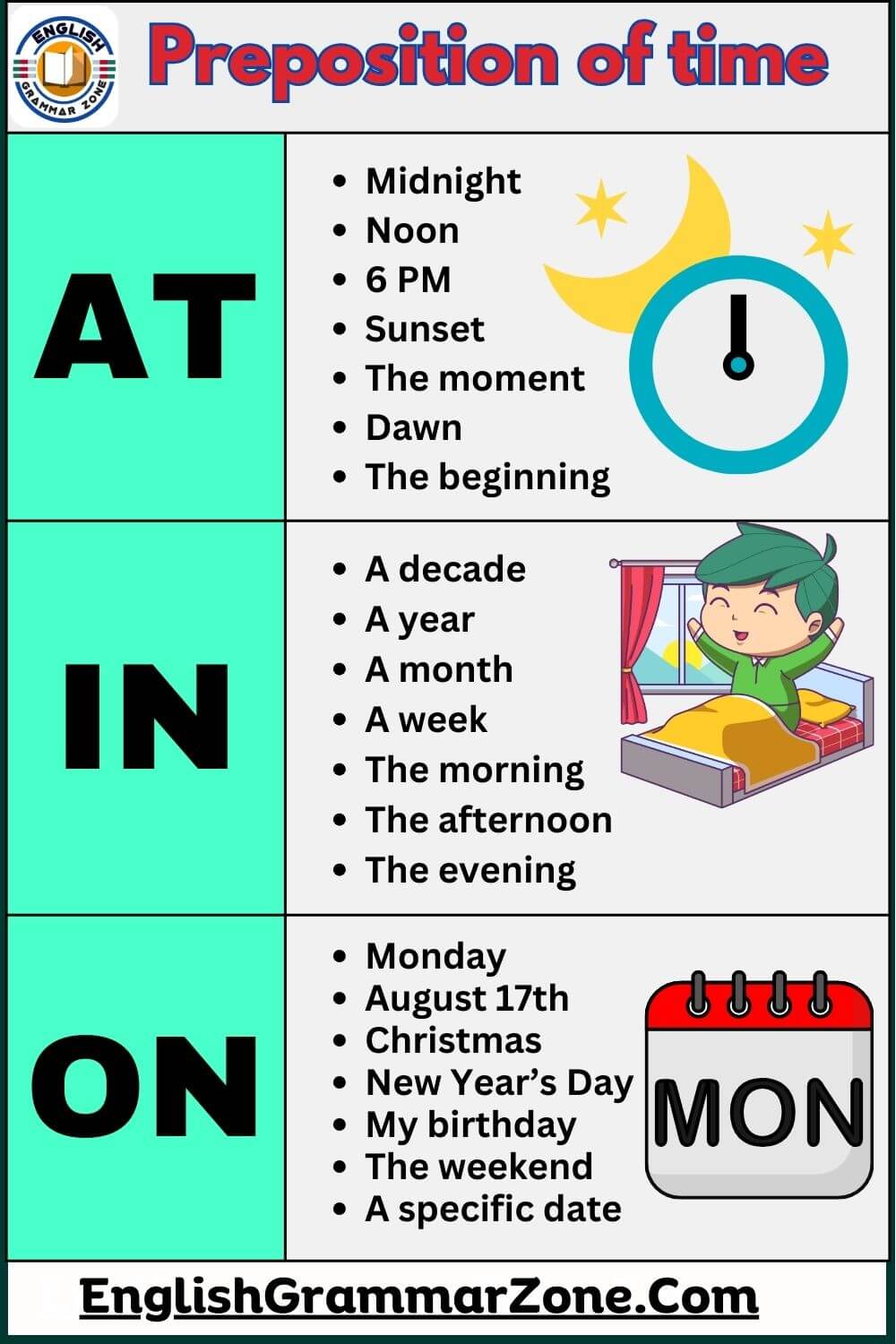Preposition of Time At, In, On,
At
- Midnight
- Noon
- 6 PM
- Sunset
- The moment
- Dawn
- The beginning
In
- A decade
- A year
- A month
- A week
- The morning
- The afternoon
- The evening
On
- Monday
- August 17th
- Christmas
- New Year’s Day
- My birthday
- The weekend
- A specific date
At
- Midnight
- Midnight is the exact point of time that marks the beginning of a new day, occurring at 12:00 AM. This moment is used to indicate the start of a new date or day in timekeeping. For example, “The event will start at midnight.”
- Noon
- Noon refers to 12:00 PM, the middle of the day when the sun is at its highest point in the sky. It’s a specific time used to denote the exact moment when the day is halfway through. For example, “Let’s meet at noon for lunch.”
- 6 PM
- This refers to 6:00 PM, which is a specific time in the evening. It is often used in scheduling and appointments. For instance, “The meeting is scheduled at 6 PM.”
- Sunset
- Sunset is the time in the evening when the sun dips below the horizon, marking the end of the day. It varies depending on the geographical location and time of year. For example, “We will have dinner at sunset.”
- The moment
- “The moment” refers to a specific point in time, often used for dramatic or important occasions. It highlights a precise instant when something happens. For example, “At the moment of the announcement, everyone gasped.”
- Dawn
- Dawn is the time early in the morning when the sun begins to rise, marking the start of the day. It is usually characterized by the first light before the sun is fully visible. For example, “The birds start singing at dawn.”
- The beginning
- “The beginning” of an event or period refers to the very start. This can be used for the inception of an activity or timeframe. For instance, “The concert starts at the beginning of the show.”

In
- A decade
- A decade is a period of ten years. The preposition “in” is used to describe events or situations occurring within this span of time. For example, “In a decade, technology will advance significantly.”
- A year
- A year refers to a twelve-month period. The preposition “in” indicates something happening within the duration of the year. For instance, “In 2024, we will launch a new product.”
- A month
- A month is approximately 30 days long. Using “in” describes events or activities occurring during that period. For example, “The report will be completed in a month.”
- A week
- A week consists of seven days. The preposition “in” is used to describe something happening within that timeframe. For instance, “The package will arrive in a week.”
- The morning
- “The morning” refers to the early part of the day, typically from midnight to noon. Using “in” can indicate activities or occurrences during this time. For example, “I like to exercise in the morning.”
- The afternoon
- “The afternoon” is the period from noon to evening, generally until around 6 PM. The preposition “in” describes events or plans within this time frame. For instance, “We have a meeting scheduled in the afternoon.”
- The evening
- “The evening” refers to the period from late afternoon until night, often from around 6 PM to bedtime. Using “in” specifies actions or events happening during this time. For example, “They usually go for a walk in the evening.”
On
- Monday
- “Monday” is the second day of the week. The preposition “on” is used to indicate specific days of the week. For example, “The office is closed on Monday.”
- August 17th
- “August 17th” is a specific date. The preposition “on” is used for particular days and dates. For instance, “The conference is scheduled on August 17th.”
- Christmas
- “Christmas” is a specific holiday celebrated on December 25th. The preposition “on” is used to indicate this particular day of celebration. For example, “We exchange gifts on Christmas.”
- New Year’s Day
- “New Year’s Day” is a specific holiday celebrated on January 1st, marking the start of the new year. Using “on” refers to this specific day. For instance, “We have a big party on New Year’s Day.”
- My birthday
- “My birthday” refers to the specific day of the year when someone was born. The preposition “on” is used to denote the exact date. For example, “I am having a party on my birthday.”
- The weekend
- “The weekend” typically refers to Saturday and Sunday. The preposition “on” is used to indicate activities or events occurring during these days. For instance, “We go hiking on the weekend.”
- A specific date
- “A specific date” refers to any particular day on the calendar. The preposition “on” is used to pinpoint the exact date. For example, “Please submit your assignment on the due date.”

